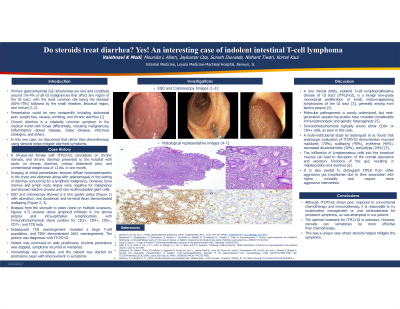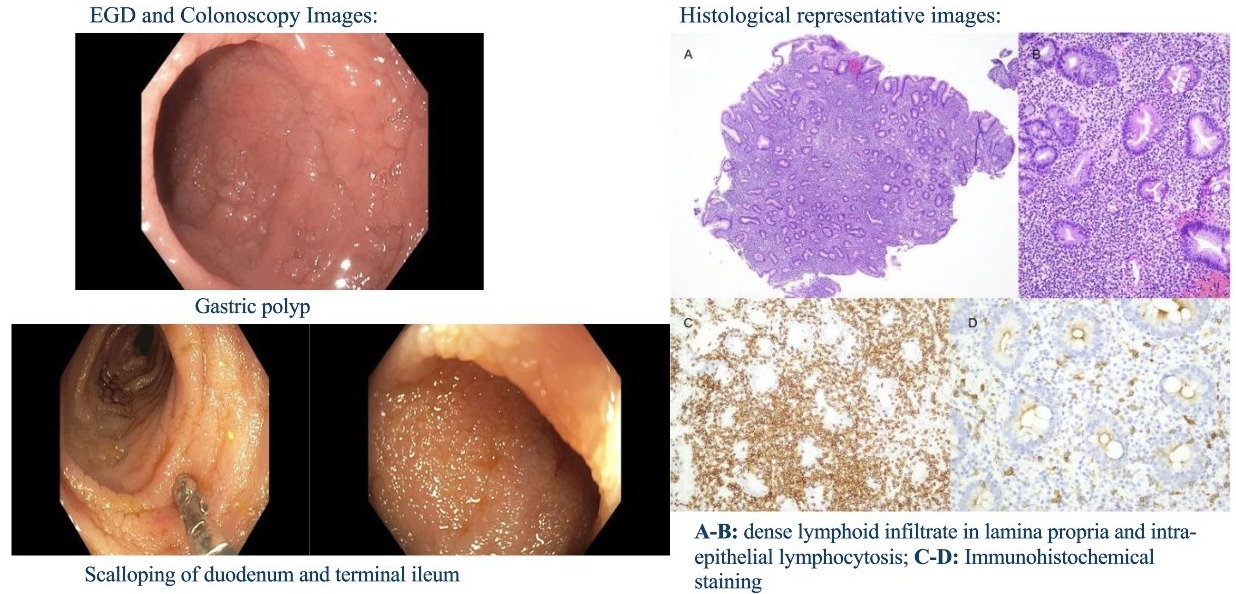Sunday Poster Session
Category: Small Intestine
P1557 - Do Steroids Treat Diarrhea? Yes! An Interesting Case of Indolent Intestinal T-Cell Lymphoma
Sunday, October 27, 2024
3:30 PM - 7:00 PM ET
Location: Exhibit Hall E

Has Audio

Vaishnavi Kalpesh Modi, MD
MacNeal Hospital Loyola Medicine
Berwyn, IL
Presenting Author(s)
Vaishnavi Kalpesh Modi, MD, Mounika L Allam, MD, Jaykumar Oza, MD, Suresh Duvvada, MD, Nishant Tiwari, MD, Komal Kaul, MD
MacNeal Hospital Loyola Medicine, Berwyn, IL
Introduction: Primary gastrointestinal (GI) lymphomas are rare (1%-4%), affecting any GI part, with the most common being stomach (60%-75%), then small intestine, ileocecal region, and rectum [1,2]. Presentation could be very nonspecific including abdominal pain, weight loss, nausea/vomiting, and chronic diarrhea [1]. In the medical field, chronic diarrhea is a common symptom having broad differentials like infections, inflammatory diseases, and cancers. In this rare case, we discovered that treating with steroids alone helps mitigate diarrheal symptoms instead of resorting to chemotherapy.
Case Description/Methods: A 54-year-old female with sarcoidosis on chronic steroids, and chronic diarrhea came with acute on chronic diarrhea, crampy abdominal pain, and inadvertent >12 lbs. weight loss in a month. Initial imaging showed diffuse LAD in chest and abdomen along with splenomegaly in the setting of diarrhea, which was concerning for lymphoid malignancy. However, bone marrow & lymph node biopsy were negative and showed a reactive process. Here endoscopies showed a 6 mm ulcerated gastric polyp, with scalloped duodenum and terminal ileum. Biopsies from the stomach to the colon showed dense lymphoid infiltrate in the lamina propria and intra-epithelial lymphocytosis with immunohistochemical stains positive for CD3+, CD4+, CD5+, CD7+, & TCR beta. TCR rearrangement showed a large T-cell population. FISH showed JAK2 rearrangement. The patient was diagnosed with ITLPD-GI and was resumed on daily prednisone. Whenever prednisone was stopped, symptoms recurred/worsened. Hematology was consulted and she was started on prednisone taper with symptomatic improvement.
Discussion: Indolent T-cell lymphoproliferative disease of the GI tract (ITPLD-GI), is a benign low-grade monoclonal proliferation of small, mature-appearing lymphocytes of the GI tract [3], arising from lamina propria [4]. Molecular pathogenesis is poorly understood, but next-generation sequencing studies have shown substantial immunophenotypic and genetic heterogeneity [5]. The mucosal lymphomatous cell infiltrate can disrupt normal absorptive and secretory functions, causing malabsorption and diarrhea [6]. As gut lymphomas have a higher mortality rate and require aggressive treatments, it is crucial to differentiate them from ITPLD. The optimal cure for ITPLD-GI is unknown, with poor response to antitumor therapy. Thus, trying a more conservative approach like oral corticosteroids for ongoing symptoms is reasonable and can be more effective than chemotherapy.

Disclosures:
Vaishnavi Kalpesh Modi, MD, Mounika L Allam, MD, Jaykumar Oza, MD, Suresh Duvvada, MD, Nishant Tiwari, MD, Komal Kaul, MD. P1557 - Do Steroids Treat Diarrhea? Yes! An Interesting Case of Indolent Intestinal T-Cell Lymphoma, ACG 2024 Annual Scientific Meeting Abstracts. Philadelphia, PA: American College of Gastroenterology.
MacNeal Hospital Loyola Medicine, Berwyn, IL
Introduction: Primary gastrointestinal (GI) lymphomas are rare (1%-4%), affecting any GI part, with the most common being stomach (60%-75%), then small intestine, ileocecal region, and rectum [1,2]. Presentation could be very nonspecific including abdominal pain, weight loss, nausea/vomiting, and chronic diarrhea [1]. In the medical field, chronic diarrhea is a common symptom having broad differentials like infections, inflammatory diseases, and cancers. In this rare case, we discovered that treating with steroids alone helps mitigate diarrheal symptoms instead of resorting to chemotherapy.
Case Description/Methods: A 54-year-old female with sarcoidosis on chronic steroids, and chronic diarrhea came with acute on chronic diarrhea, crampy abdominal pain, and inadvertent >12 lbs. weight loss in a month. Initial imaging showed diffuse LAD in chest and abdomen along with splenomegaly in the setting of diarrhea, which was concerning for lymphoid malignancy. However, bone marrow & lymph node biopsy were negative and showed a reactive process. Here endoscopies showed a 6 mm ulcerated gastric polyp, with scalloped duodenum and terminal ileum. Biopsies from the stomach to the colon showed dense lymphoid infiltrate in the lamina propria and intra-epithelial lymphocytosis with immunohistochemical stains positive for CD3+, CD4+, CD5+, CD7+, & TCR beta. TCR rearrangement showed a large T-cell population. FISH showed JAK2 rearrangement. The patient was diagnosed with ITLPD-GI and was resumed on daily prednisone. Whenever prednisone was stopped, symptoms recurred/worsened. Hematology was consulted and she was started on prednisone taper with symptomatic improvement.
Discussion: Indolent T-cell lymphoproliferative disease of the GI tract (ITPLD-GI), is a benign low-grade monoclonal proliferation of small, mature-appearing lymphocytes of the GI tract [3], arising from lamina propria [4]. Molecular pathogenesis is poorly understood, but next-generation sequencing studies have shown substantial immunophenotypic and genetic heterogeneity [5]. The mucosal lymphomatous cell infiltrate can disrupt normal absorptive and secretory functions, causing malabsorption and diarrhea [6]. As gut lymphomas have a higher mortality rate and require aggressive treatments, it is crucial to differentiate them from ITPLD. The optimal cure for ITPLD-GI is unknown, with poor response to antitumor therapy. Thus, trying a more conservative approach like oral corticosteroids for ongoing symptoms is reasonable and can be more effective than chemotherapy.

Figure: Endoscopic and Biopsy findings.
Disclosures:
Vaishnavi Kalpesh Modi indicated no relevant financial relationships.
Mounika L Allam indicated no relevant financial relationships.
Jaykumar Oza indicated no relevant financial relationships.
Suresh Duvvada indicated no relevant financial relationships.
Nishant Tiwari indicated no relevant financial relationships.
Komal Kaul indicated no relevant financial relationships.
Vaishnavi Kalpesh Modi, MD, Mounika L Allam, MD, Jaykumar Oza, MD, Suresh Duvvada, MD, Nishant Tiwari, MD, Komal Kaul, MD. P1557 - Do Steroids Treat Diarrhea? Yes! An Interesting Case of Indolent Intestinal T-Cell Lymphoma, ACG 2024 Annual Scientific Meeting Abstracts. Philadelphia, PA: American College of Gastroenterology.

